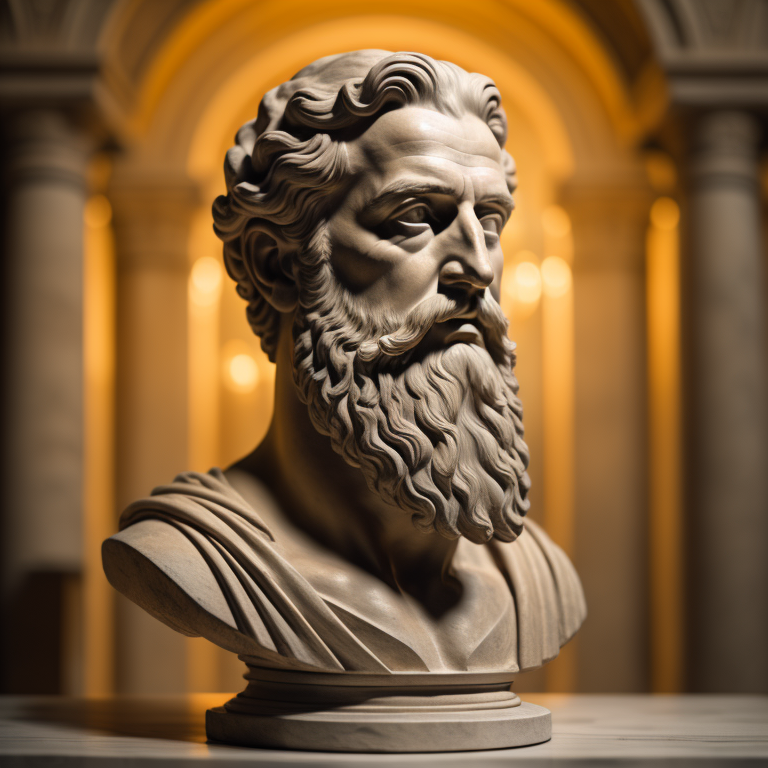
Plato
Plato : Exploring his Philosophy
Plato
Known for being one of the most influential thinkers of Ancient Greece, Plato was a disciple of Socrates and teacher of Aristotle. His focus on the search for truth and justice led him to develop a system of profound philosophical thought.
Main philosophical ideas:
The theory of ideas:
Plato believed that there are two worlds, the sensible world (the one we perceive with our senses) and the intelligible world (the world of ideas). Ideas are the things that really exist, and the sensible world is only an imperfect shadow of the intelligible world.
The theory of reminiscence:
Plato believed that souls already know ideas before they are born, and that learning is simply the process of remembering what we already know.
Ethics:
Plato believed that virtue is the supreme good, and that the four cardinal virtues are wisdom, courage, temperance and justice. Politics: Plato believed that the ideal state is an aristocracy, in which the rulers are the most wise and virtuous.
His philosophy in one sentence:
The sensible world is an imperfect shadow of the intelligible world.
Explanation of philosophy for a child:
Imagine that there is an invisible world full of things that we cannot see. This is the world of ideas, and it is the real world. The world we see is only an imperfect shadow of the world of ideas.
Explanation of philosophy for an adult:
Plato believed that reality is divided into two worlds: the sensible world and the intelligible world. The sensible world is the world that we perceive with our senses, and it is imperfect and changing. The intelligible world is the world of ideas, which is perfect and immutable. Ideas are the things that really exist, and the sensible world is only an imperfect shadow of the intelligible world.
The positive side of Plato’s philosophy
The positive side of Plato’s philosophy is that it offers us a deeper vision of reality. By dividing reality into two worlds, the sensible and the intelligible, Plato allows us to see that the things we perceive with our senses are not the real things, but only imperfect shadows of the real things. This leads us to seek truth beyond what we can see and touch, and encourages us to think about abstract concepts such as beauty, justice, and good.
The negative side of Plato’s philosophy
The negative side of Plato’s philosophy is that it can be too abstract and unrealistic. The idea that there is an intelligible world that is perfect and unchangeable can be difficult for many to accept. Furthermore, the theory of reminiscence, which says that souls already know ideas before they are born, may seem unconvincing.
A real-life problem suitable for applying this philosophy:
A real-life problem that can be solved with Plato’s philosophy is the conflict between ethics and politics. Often, we find ourselves in situations where we have to make a choice between what is morally correct and what is politically expedient. Plato’s philosophy can help us make these difficult decisions, reminding us that virtue is the highest good and that we must act in accordance with our moral principles, even if that means going against the grain.
For example, let’s imagine that we are a public official faced with the decision of whether to approve a bill that we know is corrupt. Plato’s philosophy would tell us that we should reject the bill, even if it means losing our job. This is because virtue, in this case honesty, is more important than politics.

The opposite philosophy to Plato’s is empiricism.
Empiricism is the belief that all knowledge is derived from sensory experience. This means that ideas are not innate, but are formed from what we experience in the world. Empiricism opposes Plato’s theory of forms, which maintains that ideas are more real than the things we perceive with our senses. Empiricists argue that there is no evidence that ideas exist independently of experience.
The positive aspects of empiricism include:
- It is a more realistic philosophy than Plato’s theory of forms. Empiricism allows us to learn about the world through experience.
Empiricism can help us solve practical problems.
The negative aspects of empiricism include:
- Empiricism can be relativistic, as there is no absolute standard of truth. Empiricism can be dissatisfied, as there is always more to learn. Empiricism can be deterministic, as it suggests that our thoughts and actions are determined by our experiences.
In general, empiricism is a philosophy that emphasizes the importance of sensory experience in the formation of knowledge. It is a more realistic philosophy than Plato’s theory of forms, but it can also be relativistic and unsatisfied.

Sources
Books:
- Plato’s Republic. This work is one of the most important in Western philosophy and exposes Plato’s main ideas on metaphysics, epistemology, ethics and politics.
The myth of Plato’s cave. This myth is one of the best-known allegories in philosophy and explains Plato’s theory of ideas.
Empiricism of R.G. Collingwood. This book is an introduction to the philosophy of empiricism and explains its main ideas.
Websites:
- Platón:https://plato.stanford.edu/ de la Stanford Encyclopedia of Philosophy. Este sitio web es una fuente de información muy completa sobre la filosofía de Platón.
El empirismo: https://www.britannica.com/topic/empiricism de la Encyclopædia Britannica. Este sitio web ofrece una definición clara y concisa del empirismo.
Pragmatismo: https://plato.stanford.edu/entries/pragmatism/ de la Stanford Encyclopedia of Philosophy. Este sitio web explica las principales ideas del pragmatismo.





0 comments